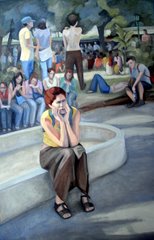We missed being in BsAs for Cristina´s inauguration, but, as luck would have it, we were in Santiago for the 1st anniversary of the dictator Augusto Pinochet´s death. So when we went to the Palacio de la Moneda (the President´s office—a White House of sorts, except that Chilean presidents live in their own homes, and where Allende was assassinated by CIA-sponsored Pinochet´s troops, bombs, and aircraft fire), it was closed to the public. The guard said they were preparing for Christmas (yeah, and I´m tall, thin, and young!). Demonstrations were expected from both sides of the spectrum. When we ambled down one of the two or three streets permanently closed to traffic, there was a silent march of a handful of young communists, anti-Pinochet, of course. It was very moving to see a country coming out of such a tragic period to the point that there was freedom on the part of both sides to express their opinion. Even on TV tonight there was a game show made up of 4 teams of budding journalists who were assigned to cover different aspects of the coup d’état—both before and after. Their reports were then judged by professional journalists whose decision produced a “winner.” I think the real winner was Chile.
I am gratified that my students are reading these journal entries and responding. Here is another question from Aleksey:
I'm really enjoying these writings. They give me a little bit of insight into different cultures within the Latin world. To tell the truth, I don't really know much about Chile. What is their Spanish like (I find the different variations of Spanish each country has very interesting)?
The dialect in Chile is unlike that of Argentina in the following ways: They use tú instead of vos, and vocabulary items are different. For example, aguacate (avocado) is called palta, etc. The intonation pattern in BsAs, so Napolitano, simply doesn´t exist in Chile. So, they would be easier to understand for a student of Spanish in the US. There is, additionally, a aspirated s’s that we find in Caribbean Spanish, and some l-r confusion. I am noticing a different pronunciation of the r after consonants like t, as well.
The personality of Chile isn´t as large as that of Argentina. These two countries don´t play well together. I chalk it up to the immigrant presence in Argentina, a country of immigrants principally from Italy. Chile has a more varied population with a presence of indigenous people. There are many more mestizos here. Chile did have a certain presence of Incas, although it was not so great as that of Peru, Bolivia, and Ecuador. Chile´s national hero is Bernardo O’Higgins, who did not participate in the Liberation to such an extent as San Martín or Bolívar, so is relegated to a position of second importance, not unlike Chile´s position today. However, Chile’s economy is stronger and more stable than that of Argentina. We get a lot of summer fruit during our winter from Chile. It also boasts of a strong wine industry. (It really boasts that it is the country in America furthest to the south—take a look at a map and you’ll see that Chilean territory winds its way around the tip of Argentina—another way to stick it to the argentinos…and that territory is contested, I believe.)
Chilean President Michelle Bachelet is past the half point mark of her presidency of a non-repeatable 4-year term. The news tonight showed her in BsAs at Cristina Fernández de Kirschner´s inauguration, seated far away from Hugh Chávez. The last time those two had meet was the infamous rebuke by King Juan Carlos I of Spain to Chávez, ¿Por qué no te callas?—why don´t you shut up? Actually there is some resentment toward her because she didn´t control the situation when Chávez kept interrupting Spain´s PM, Rodríguez Zapatero’s speech. It´s a telenovela (soap opera)!
Music on radio—lots of US rock, some Latin pop, and little Chilean offerings. Argentina´s music is much more clearly defined. TV on cable—BBC, France Monde, RAI (Italy), only part-time Spain, CNN International and en español, and several Chilean outlets. No Deutsche Welle.
More later
14.12.07
Subscribe to:
Post Comments (Atom)


No comments:
Post a Comment